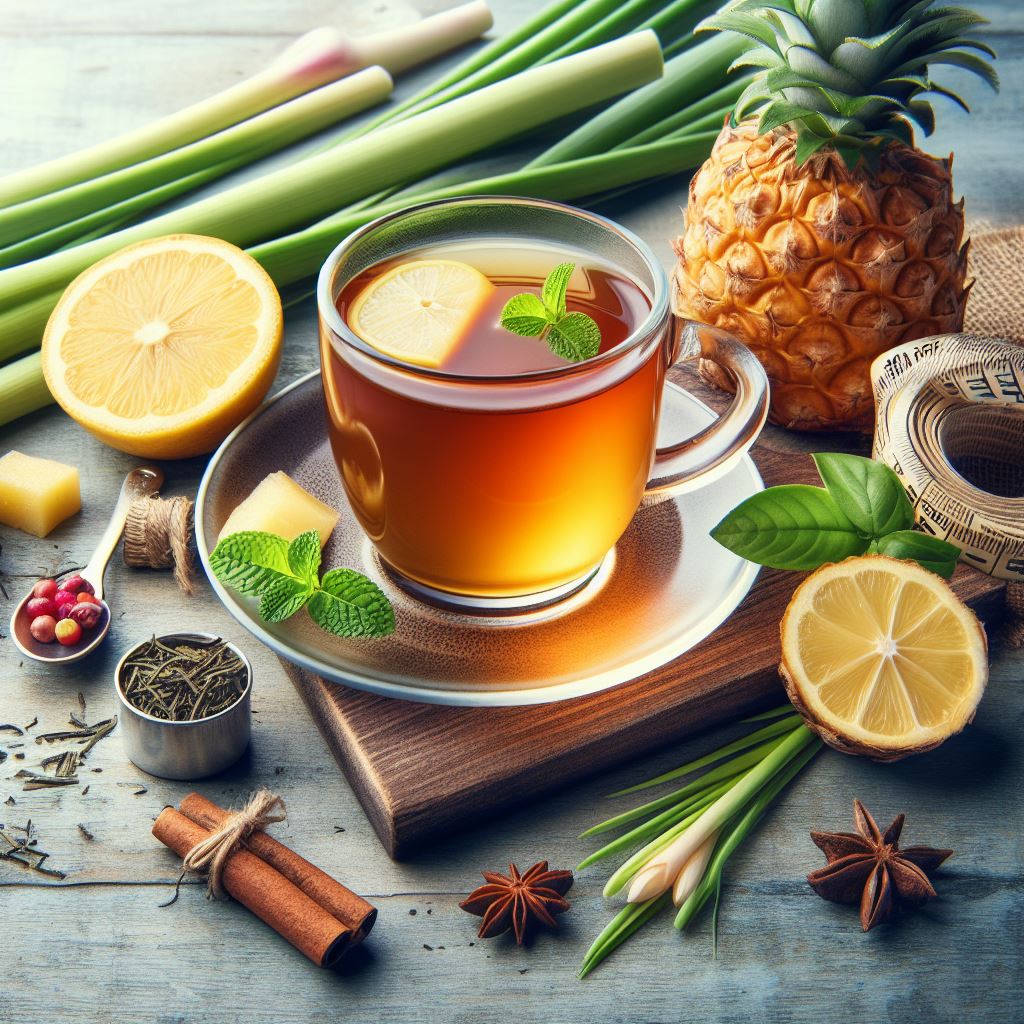Rosemary tea is a delicious and aromatic drink that can be enjoyed hot or cold, anytime of the day. It is made from fresh or dried rosemary leaves, which have a pungent, slightly bitter taste and a fragrant scent. This tea has many health benefits, such as improving memory, digestion, circulation, and hair growth. It also has a long history of use in traditional medicine and cuisine.
In this blog post, we will show you how to make rosemary tea at home with simple ingredients and steps. You will also learn some interesting facts about rosemary, its history and uses, and some tips and tricks to enhance your experience. Let’s get started!

What You Need to Make Rosemary Tea
To make rosemary tea, you will need the following ingredients:
- 2-3 teaspoons of fresh or 1 tablespoon of dried rosemary leaves
- 2 cups of boiling water
- Honey or agave syrup (optional)
- Lemon juice (optional)
You can use either fresh or dried rosemary leaves for your tea. Fresh rosemary has more flavor and aroma than dried ones, but it also loses some of its potency over time. Dried rosemary is more convenient and shelf-stable than fresh ones, but it may have a less intense taste and smell.
If you are using fresh rosemary leaves, you can either chop them finely or leave them whole. If you are using dried rosemary leaves, you can either crush them lightly with your fingers or use a mortar and pestle.
How to Make Rosemary Tea
Making rosemary tea is very easy and quick. Here are the steps to follow:
- Boil the water in a kettle or a pot.
- Add the rosemary leaves to the boiling water.
- Cover the pot with a lid and let it steep for 5 minutes or longer.
- Strain the tea into a mug or a teapot.
- Add honey or agave syrup if desired to sweeten the tea.
- Squeeze some lemon juice over the tea if desired to add some acidity and freshness.
That’s it! Quick, simple, and cheap!
Why Rosemary Tea Is Good for You
Rosemary tea has many health benefits that can benefit your body and mind in various ways:
- Rosemary can help improve your digestion by stimulating the production of bile and gastric juices. It can also help relieve indigestion by relaxing the muscles of the digestive tract.
- Rosemary can help enhance your memory and concentration by increasing blood flow to the brain. It can also help prevent cognitive decline by protecting brain cells from oxidative stress.
- Rosemary can help improve your circulation by dilating blood vessels and preventing blood clots. It can also help lower blood pressure by relaxing smooth muscles in the arteries.
- Rosemary can help promote hair growth by stimulating blood supply to the scalp. It can also help prevent hair loss by reducing inflammation in the hair follicles.
The History of Rosemary Tea

Rosemary tea has a long and rich history that spans across different cultures and continents. It is one of the oldest and most widely used herbal teas in the world, with many benefits and uses for health and well-being. Here are some of the highlights of its history:
- This tea was first mentioned in ancient Mesopotamia, where it was used as a preservative and a disinfectant for wounds and infections. It was also associated with the goddess Ishtar, who was said to have a rosemary wreath on her head.
- It was also revered by ancient Egyptians, who used it for embalming corpses and mummifying bodies. They also believed that rosemary could ward off evil spirits and bring good luck.
- This tea was popular among ancient Greeks and Romans, who used it for culinary and medicinal purposes. They considered it one of their sacred herbs and associated it with remembrance and fidelity. They also used it to enhance memory, digestion, circulation, hair growth, skin health, and sexual performance.
- Rosemary tea was introduced to Europe by the Arabs in the Middle Ages, who brought it from North Africa and Spain. It was also cultivated by the Native Americans in North America, who used it for healing and spiritual purposes.
- The tea became more widely available and accessible in the modern era, as it was grown in gardens and greenhouses around the world. It was also used in various industries such as food, cosmetics, pharmaceuticals, and aromatherapy. It was also studied by scientists and researchers, who discovered its many benefits and properties.
Tips & Tricks
Rosemary tea has a unique flavor and aroma that can be enjoyed in different ways. Here are some suggestions on how to enjoy it in different ways:
- You can add some honey or agave syrup to sweeten your rosemary tea. Honey and agave syrup can also enhance the flavor and health benefits.
- You can squeeze some lemon juice over your rosemary tea to add some acidity and freshness. Lemon juice can also help balance the bitterness and boost your vitamin C intake.
- You can mix your rosemary tea with other herbal teas such as mint, chamomile, lavender, or lemon balm. This can create a more complex and soothing blend of flavors and aromas.
- You can add some milk or cream to your rosemary tea to make it more creamy and smooth. Milk or cream can also help reduce the bitterness and add some calcium and protein to your drink.
- You can chill your rosemary tea and serve it over ice for a refreshing and cooling drink. You can also add some fresh fruit slices such as orange, apple, or strawberry to your iced tea for a more colorful and flavorful drink. Learn more in our article on Cold Brew Tea: The Ultimate Guide for Refreshing Tea Lovers
Some Recipes and Combinations to Try
Rosemary tea can also be used as an ingredient in various recipes and combinations. Here are some examples of how you can use it in your cooking and baking:
- You can use rosemary tea as a base for soups, stews, sauces, or marinades. The tea can add a rich and savory flavor to your dishes and enhance the taste of other ingredients such as meat, vegetables, or cheese.
- You can use rosemary tea as a substitute for water or milk in your baking. Using this tea can add a moist and fragrant touch to your cakes, muffins, cookies, or breads.
- You can use rosemary tea as a flavoring for your ice cream, yogurt, or smoothies. It can add a refreshing and herbal twist to your desserts and snacks.
- You can use rosemary tea as a mocktail mixer. It pairs well with various strong drinks. Try adding some sugar, lime, or mint to your tea mocktail for a more festive and fun drink.
Conclusion
Rosemary tea is a wonderful drink that can offer you many benefits and pleasures. It is easy and quick to make at home with simple ingredients and steps. It is also versatile and adaptable to your preferences and occasions. Whether you want to relax, energize, heal, or enjoy, rosemary tea can be your perfect companion. Try it today and discover its magic!
Discover More Tea-Related Articles:
- How to Enjoy Tea with Jam: A Russian Tradition
- Echinacea Tea: How to Brew and Enjoy This Floral Elixir
- How to Make Tea from Your Christmas Tree 🎄
- What Tea Has the Most Caffeine? The Answer Might Surprise You!
- Da Hong Pao Tea – The Most Expensive Tea in the World
Sources:
- Healthline: 6 Benefits and Uses of Rosemary Tea
- Medical News Today: Rosemary: Health benefits, precautions, and drug interactions:
- Britanica: Rosemary | Description, Plant, Spice, Uses, History & Facts:
- Rosemary – Wikipedia:
- Gardening Know How: History Of Rosemary – Learn About Rosemary Herbal Uses:





Leave a Comment